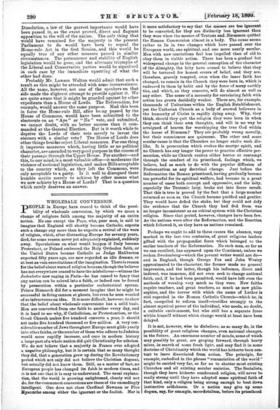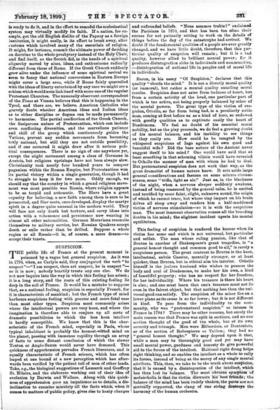WHOLESALE CONVERSION.
pEOPLE in Earope_ have ceased to think of the possi- bility of wholesale conversion, by which we mean a change of religions faith among the majority of an entire nation. No one except the Pope, who, poor man, is said to imagine that England will shortly become Catholic, expects such a change any more than he expects a revival of the wars of religion, which, after distracting Europe for seventy years, died, for some reason never yet adequately explained, suddenly away. Speculations on what would happen if Italy became Protestant, or Poland embraced the Holy Orthodox faith, or the United States became Catholic as Judge Halibarton expected fifty years ago, are now regarded as idle dreams, or at best as vain exercitations of the imagination. There is reason for the belief about wars of religion becau se, though the believer has not everywhere ceased to hate the misbeliever—witness the Judenhetze now raging in Paris—he has ceased to fancy that any nation can be sabred into a faith, or indeed can be forced by persecution within a particular ecclesiastical system. Prince Bismarck did for a moment imagine that he might be successful in firing cannon at ghosts, but even he soon wearied of so infractuous an idea. It is more difficult, however, to show that the belief about wholesale conversions has a solid basis. Men are converted from one faith to another every day, and it is hard to see why, if Catholicism, or Protestantism, or the Greek Church makes five hundred converts a year, it should not make five hundred thousand or five million. A very con- siderablenumber of Jews throughout Europe must glide yearly into other faiths, or the number of those who adhere to Judaism would more rapidly increase, and once in modern history a large part of a whole nation did quit Christianity for atheism, We do not believe that a majority in France ever adopted a negative philosophy, but it is certain that so many thought they did, that a generation grew up during the Revolutionary period which not only did not believe the Christian dogmas, but actually did not know them. Still, as a matter of fact, no European people has changed its faith in modern time; and it is not one that it is easy to understand. The usual explana- tion, that the world is growing enlightened, clearly will not do, for the commonest conversions are those of the exceedingly intelligent. One does not class Cardinal Newman or Pere Hyacinthe among either the ignorant or the foolish. Nor is it more satisfactory to say that the masses are too ignorant to be converted, for they are distinctly less ignorant than they were when the masses of Teutons and Norsemen quitted the Roman Communion almost in a body. The cause seems rather to lie in two changes which have passed over the European world, one spiritual, and one more nearly secular. Men with new convictions feel less impelled than of old to obey them in visible action. There has been a gradual but widespread change in the general conception of the character of the Almighty, the laity have ceased to believe that they will be tortured for honest errors of belief, and they are, therefore, gravely tempted, even when the inner faith has changed, to remain in the Church they were born in, which is endeared to them by habit and by the force of many earthly ties, and which, as they conceive, will do almost as well as any other. The sense of a necessity for correlating faith with action has grown decidedly weaker. There are, for example, thousands of Unitarians within the English Establishment, yet the Unitarian Church as a body of avowed believers in the humanity of Christ is rapidly dying away. Why, they think, should they quit the religion they were born in when they can think their own thoughts, and will in no way be arraigned of heaven for worshipping the true God within the house of Rimmon ? They are probably wrong morally, but their consciences are quiescent. The other and more secular cause is that the Churches no longer excite such dis- like. It is persecution which evokes the martyr spirit, and no Church has any longer the power to practise effective per- secution, while no Church excites either horror or contempt through the conduct of its priesthood, feelings which, we believe, had as much to do with the popular diffusion of Protestantism as any doctrinal change. Just before the Reformation the Roman priesthood, having gradually become too powerful for its spiritual welfare, had become in a great number of cases both corrupt and oppressive, and the laity, especially the Teutonic laity, broke out into fierce revolt. That this is true is proved by the fact that a large number returned as soon as the Church became purified and gentler. They would have defied the stake, but they could not defy the evidence that the Church they had fled from was no longer inconsistent as an ethical system with the Christian religion. Since that period, however, changes have been few. As the nations were after the Reformation, and the Reaction which followed it, so they have as nations remained.
Perhaps we ought to add to these causes the absence, very marked in the last two centuries, of great religious leaders gifted with the propagandist force which belonged to the earlier teachers of the Reformation. No such man, so far as we can recollect, has appeared upon the Continent, unless we reckon Swedenborg—which the present writer would not do— and in England, though George Fox and John Wesley approximated to the character, the former made no general impression, and the latter, though his influence, direct and indirect, was immense, did not even seek to change national faith, and, if he had been permitted, would have left even the methods of worship very much as they were. New faiths require teachers, and great teachers, as much as new philo- sophies, and the horror with which the name of Luther is still regarded in the Roman Catholic Church—which he, in fact, compelled to reform itself—testifies strongly to the almost mystical power of the individual, who needs, no doubt, a suitable environment, but who still has a separate force within himself without which change would at least have been delayed.
It is not, however, wise to disbelieve, as so many do, in the possibility of great religious changes, even national changes, in the future. An enormous number of minds, some of which may possibly be great, are groping forward, through heavy mists, in search of some fresh light, and may find it in some doctrine of Christianity which the world has hitherto been con- tent to leave dissociated from action. The principle, for example, embodied in the phrase "renunciation of the world" might be carried very far, so far as to shatter most existing Churches and all existing secular societies. The Socialists, though they have hitherto condemned religion, will never be really strong until they have adopted some spiritual faith of that kind, only a religion being strong enough to beat down instinctive selfishness. Or a nation may give up some dogma, say, for example, sacerdotalism, before its priesthood
is ready to do it, and in the effort to remodel the ecolesiastical system may virtually modify its faith. If a nation, for ex- ample, got the old English dislike of the Papacy as a foreign institution, it might easily, in its effort to break away, alter customs which involved many of the essentials of religion. It might, for instance, commit the ultimate power of deciding on doctrine to the whole presbytery instead of the Holy Chair, and find itself, as the Scotch did, in the hands of a spiritual oligarchy moved by aims, ideas, and enthusiasms radically different from those of Rome. If the Greek Church suddenly grew alive under the influence of some spiritual revival we seem to fancy that national conversions in Eastern Europe might cover a large area, while if Rome fairly quarrelled with the ideas of liberty entertained by any race we might see a schism which would soon link itself with some one of the regular Protestant Churches. The unusually observant correspondent of the Times at Vienna believes that this is happening in the Tyrol, and there are, we believe, American Catholics who gravely doubt whether American ideas and Italian ideas as to either discipline or dogma can be made permanently to harmonise. The partial ossification of the Greek Church, the fissiparous nature of Protestantism, which can include even conflicting diversities, and the marvellous patience and skill of the group which continuously guides the Vatican, prevent any sudden movements from becoming truly national, but still they are not outside possibility, and if one occurred it might draw after it serious poli- tical consequences. There is no sign of one anywhere yet, except the slight movement among a class of Germans in Austria, bat religious uprisings have not been always slow. Christianity took nearly four hundred years to conquer paganism within the Roman Empire, but Protestantism won its partial victory within a single generation, though it had to struggle to keep it for two more. Oddly enough, we should say that the country in which a grand religious move- ment was most possible was Russia, where religion appears to be so torpid and automatic. The Slays have a great capacity for believing, a new faith among them is sure to be persecuted, and Slav sects, once developed, display the martyr spirit in a degree quite unusual in the modern world. They will face not only death but torture, and carry ideas into action with a vehemence and persistence now wanting in almost all other nationalities. German Moravians reconcile themselves to military service, but Russian Quakers accept death or exile rather than be drilled. Suppose a whole region or all Russia—it is, of course, a mere dream—to accept their tenets.







































 Previous page
Previous page